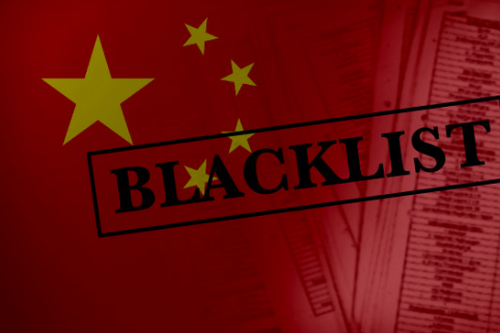First Russia, Now China? President Biden Readies Watered-Down Beijing Blacklist Order
“China Joe” Biden has entered the chat.
President Biden is preparing to amend a sweeping US ban on trading with Chinese firms with connections to the PLA, China’s military, after the policy, initially proposed by President Trump, was challenged in court.
According to Bloomberg, under Biden’s amended order, the Treasury Department will create a list of companies that could face financial penalties for their connection to China’s defense and surveillance technology sectors, the people said. Previously, the nature of the financial sanctions and the specific companies targeted were set via a Congressionally mandated report from the Pentagon.
The amended order, which Biden is set to sign later this week, will change the criteria for entry on the blacklist to capture those companies that operate in the defense or surveillance technology sectors. Previously, President Trump’s more broad-based order targeted companies owned, controlled or otherwise affiliated with the Chinese military. The order will also shift control of the blacklist from the Pentagon to the Treasury.
Per BBG, the Biden Administration expects to keep “a large number” of companies already included on the entities’ list, while allowing Treasury’s Office of Foreign Assets Control to add a few new companies as well.
Two Chinese companies have successfully challenged the order (including TikTok owner ByteDance) and the White House claims that these revisions are necessary to “ensure it’s legally sound and sustainable” over the long term. By shifting responsibility to the Treasury, Biden hopes to shore up the legal standing for the order.
The review has been closely watched on Capitol Hill, where lawmakers of both parties are now open to a tougher stance on Beijing (especially after the Biden Administration has been forced to acknowledge that the “lab leak” theory of COVID-19’s origins isn’t a “conspiracy theory”, but in fact the most probable scenario.
A bipartisan group of lawmakers – including Florida Senator Marco Rubio, Arizona Democrat Senator Mark Kelly and Representative Liz Cheney – demanded the publication of a new list of Chinese military-affiliated entities in a letter sent to Defense Secretary Lloyd Austin this week.
Technically, a list of targeted firms was due April 15 and is mandated by last year’s defense authorization bill. However, it appears that under the Biden Administration, the Pentagon has let its responsibilities lapse as it waits for authority to be transferred to Treasury.
“The U.S. government must continue to act boldly in blocking the Chinese Communist Party’s economic predation against our industrial base,” they said in the letter. “We must not allow China to erode America’s military primacy.”
Wall Street has also been closely watching Biden’s plan after Trump’s initial order was met with “confusion” in the world of markets, according to Bloomberg.
Amid all the confusion, the Biden Administration has pushed back a deadline that would have closed a loophole: investors can still pump money into subsidiaries of listed firms, despite a ban on the listed parent companies, which has been in place since November. It appears that Biden plans to keep this loophole intact, as the new rules are expected to only apply to subsidiaries if they are specifically listed by the Treasury.
“Providing Treasury with authority over which Chinese military companies are subject to capital markets sanctions would tend to help Wall Street maintain the status quo to the extent possible,” said Roger Robinson Jr., former chairman of the Congressional U.S.-China Economic and Security Review Commission.
Bottom line: Biden’s plan will be much less comprehensive than Trump’s. Not that it matters, since the courts largely sided with Chinese firms, including (as we mentioned earlier) ByteDance, the TikTok parent, which won a court battle allowing it to evade Trump’s attempt to blacklist the popular social media app.
The big question now is whether Biden will keep the pressure on firms like Huawei, which was identified as a key threat to American national security over its propensity to spy on behalf of Chinese intelligence, something it’s technically required to do by Chinese law (Note: the company itself denies all of this, and claims it has never spied on Beijing’s behalf, despite being caught red-handed more than once). GOP Senators are skeptical, and have recently channeled that anger into opposing a Biden nominee – Christopher Fonzone, Biden’s pick to be legal counsel at the Office of the Director of National Intelligence – despite having previously done legal work for the Ministry of Commerce and Huawei.
And there’s always the financial dealings of Biden’s son, Hunter Biden, which involved figures with close ties to China’s intelligence apparatus.
Tyler Durden
Wed, 06/02/2021 – 17:06
via ZeroHedge News https://ift.tt/3fIep1S Tyler Durden
